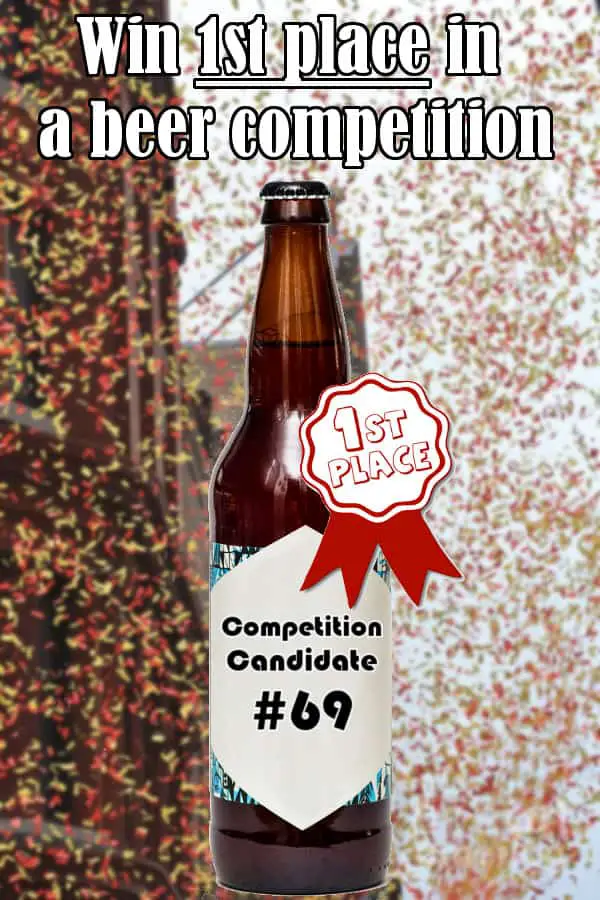Entering a beer brewing competition is easier than you may have first thought. It’s not at all elitist and is, in fact, open to any brewer of any skill level. Of course, to win the more prestigious competitions you need to be at the top of your game, but that shouldn’t put newer home brewers off entering their first competition.
If you have a few brew days under your belt and you are consistently making very drinkable beers, then it’s high time you went for a ribbon.
So briefly, how do you enter a beer brewing competition?
In order to successfully enter a beer brewing competition, you need to select a suitable event, thoroughly read the guidelines, brew a beer which fits any particular category, pay the fee & send your beer to the judges before the deadline. After the judging, you’ll always receive some feedback.
That’s a beer competition in a nutshell, but there is way more to think about if you want to win a prize.
In the following article, I have compiled all the information I have gleaned from speaking to judges and competition winners alike.
These tips and golden nuggets of advice will ensure that you thoroughly enjoy your experience as a beer brewing competitor and will help you win some prizes!
Navigate this article:
Why compete in beer competitions, it’s just for fun right?
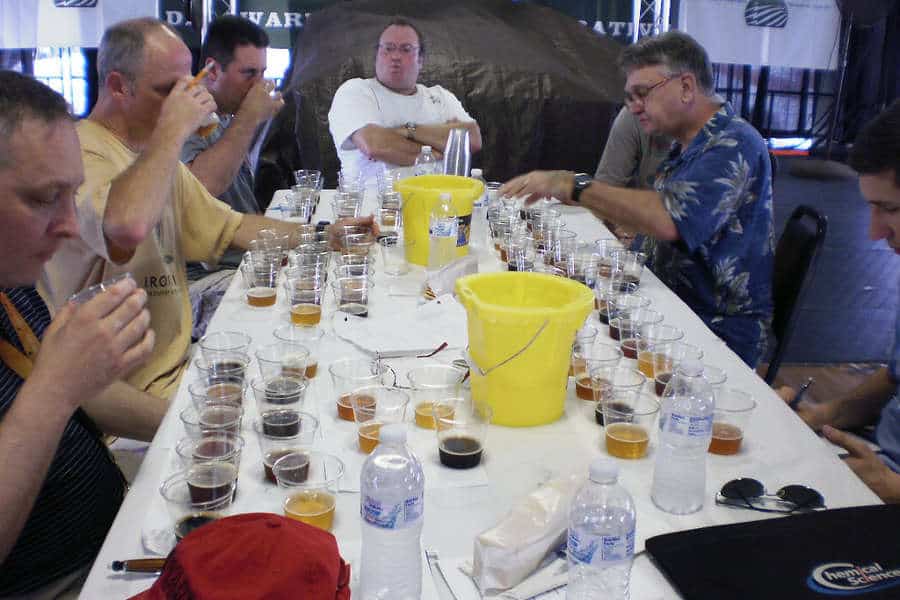
If you are fairly new to brewing beer at home then your first step is to get a few more brew days under your belt. Brewing beer that you actually want to drink is a big help in improving your abilities as a brewer, and also to improve your chances of winning a prize.
Winning first place may not happen overnight, but it can happen sooner than you think. All it takes is determination, attention to details, the ability to learn from mistakes and the ability to enjoy brewing!
The major issue for most homebrewers is that they pursue this hobby in a very lone-wolf style. By this, I mean that they brew at home and only have virtual contact with other brewers. Much of their product is only sampled by friends and family, which is a great thing to be able to share, but may not give you useful feedback. Remember that most people are happy with a bud light at the end of the day (I’m not judging honest!). So, the most you will get in feedback is “that’s great” or “It’s OK”. The problem with this is that most brewers after a while will start to disagree with their family’s opinion about their own beer!
The major benefit of a beer competition is that, for the most part, the judges are professionally trained and can give you very useful feedback and constructive criticism of your beer. If you are hoping to grow as a brewer, you really need to hear why your beer is less than perfect from time to time. So, get ready to grow a slightly thicker skin and jump feet first into the thrilling world of home brewing gladiatorial games!
Preparing for the competition
How to get started
Just as I wouldn’t recommend your first 100-meter sprint be against Usain Bolt, I wouldn’t recommend a new brewer to compete in a top-level beer competition. Sip before you glug!
An excellent way to dip your toe into the beer competition scene is to find your local homebrew club and participate in one of their competitions. These are normally geared towards a newer competitor and are great sources of advice and helpful tips. It’s also going to be a relatively inexpensive way to try your hand at producing a prize-winning beer.
Where to enter competitions in the USA
In North America, the best port of call to find a competition to compete in is BJCP.org. This is an organization that helps people train to become beer judges and is the ideal place to find local and international beer competitions you can enter.
Be aware that many of the competitions listed are also outside the continental United States, so when entering them consider the time for shipping your beer and any issues you may have with customs, etc.
How is beer judged?
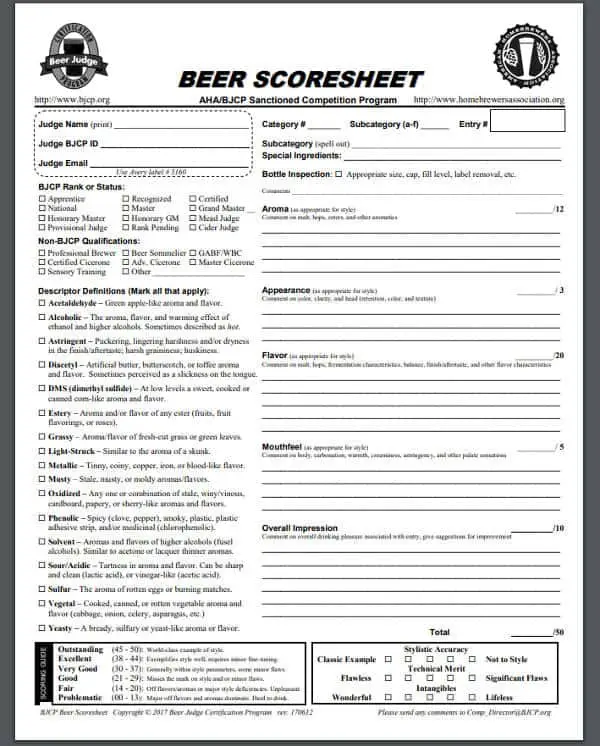
Your beer is judged by 6 main criteria, namely its aroma, appearance, flavor, mouthfeel and any off-flavors present. All of these areas are then summarized in an overall impression held by the judge to give the sixth scoring category.
The scoring is out of 50 points and flavor is by far the heaviest weighed category of scoring for the entire beer judging as it represents nearly 50 % of the total maximum score. The aroma and overall impression are also areas where a lot of points can be gained or lost.
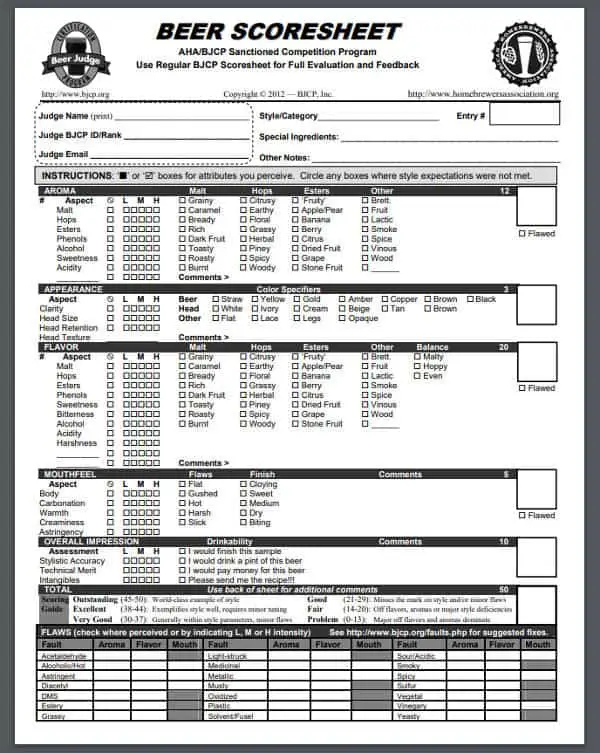
Let’s look at each area of grading in more details:
Aroma
You are going to be graded on the balance of malts and hops in your beer, so make sure that you experiment to get the ideal balance between them for the particular beer category you have entered. Also, be aware of the level of esters and other aromatics in your beer. Off-flavors will score you lower if not intentionally present.
Appearance
Here the judges will be looking for color and clarity of your beer as well as its head retention, the color of the head and its texture. The color of your beer is ultimately decided by the malts you use, so play around with what SRM you can get from the finished beer using different varieties by working with the Lovibond scale of those malts. Also, be aware of the level of carbonation in your beer to ensure better head retention.
Flavor
This category of grading has perhaps the largest spectrum of difference between beers and so can gain ( or lose) you the most points. Here the judges are looking at your use of malts and hops and how well you can balance the two. They will also consider the effects of the fermentation process on your beer as well as its finish and aftertaste. Here, off-flavors will also play a negative role if present when they shouldn’t be. Batch test your best beer and play around with different ingredients and methods to find a winner.
Mouthfeel
The judges are going to score you on the way that the beer feels in their palate. Whether it is creamy or astringent and how this complements the beer variety. They will also judge you on the level of carbonation in your beer and how to affects the taste of the beer.
Overall Impression
Here the judge gives their opinion of the beer as a consumer. This is a summary of how the aroma, appearance, flavor, and mouthfeel add or subtract from the overall enjoyment and pleasure of drinking the beer. What’s more, this is where you’ll get most of their feedback and criticism (which helps you grow as a brewer).
Off flavors
Depending on your beer style you may need some of these flavors in a good example of that beer, often however these are undesirable additions.
- Acetaldehyde
- Astringent Diacetyl
- DMS (dimethyl sulfide)
- Estery
- Light-Struck
- Metallic
- Musty
- Oxidized
- Phenolic
- Solvent
- Sour/Acidic
- Sulfur
- Vegetal
- Yeasty
Extra things to remember!
Make sure that you follow the competition guidelines on bottling your beer. Use the correct size bottle, the appropriate caps (no motifs), fill the bottle to the required level and make sure your labels are correct as regards competition rules
Scoring system
Outstanding | 45-50 | World class level |
Excellent | 38-44 | minor tweaks needed |
Very Good | 30-37 | minor flaws present |
Good | 21-29 | Just misses the mark/flaws |
Fair | 14-20 | unpleasant to drink (off-flavors) |
Problematic | 0-13 | hard to drink (off-flavors) |
See notes on the scoring system: source
What types of beers can I enter into a competition?
As the entree into a beer competition, it is your responsibility to enter your beer into the correct category. This doesn’t always mean by the beer variety you have tried to brew but rather by its individual characteristics.
Each competition will have its own categories but below you will find the full list as set out by the BJCB (source) of possible beer categories you could enter your best beer into.
STANDARD AMERICAN BEER
- American Light Lager
- American
- Cream Ale
- American Wheat Beer
INTERNATIONAL LAGER
- International Pale Lager
- International Amber Lager
- International Dark Lager
CZECH LAGER
- Czech Pale Lager
- Czech Premium Pale Lager
- Czech Amber Lager
- Czech Dark Lager
PALE MALTY EUROPEAN LAGER
- Munich Helles
- Festbier
- Helles Bock
PALE BITTER EUROPEAN BEER
- German Leichtbier
- Kölsch
- German Helles Exportbier
- German Pils
AMBER BITTER EUROPEAN BEER
- Vienna Lager
- Altbier
- Kellerbier:
- Kellerbier: Pale Kellerbier
- Kellerbier: Amber Kellerbier
DARK EUROPEAN LAGER
- Munich Dunkel
- Schwarzbier
STRONG EUROPEAN BEER
- Doppelbock
- Eisbock
- Baltic Porter
GERMAN WHEAT BEER
- Weissbier
- Dunkles Weissbier
- Weizenbock
BRITISH BITTER
- Ordinary Bitter
- Best Bitter
- Strong Bitter
PALE COMMONWEALTH BEER
- British Golden Ale
- Australian Sparkling Ale
- English IPA
BROWN BRITISH BEER
- Dark Mild
- British Brown Ale
- English Porter
SCOTTISH ALE
- Scottish Light
- Scottish Heavy
- Scottish Export
IRISH BEER
- Irish Red Ale
- Irish Stout
- Irish Extra Stout
DARK BRITISH BEER
- Sweet Stout
- Oatmeal Stout
- Tropical Stout
- Foreign Extra Stout
STRONG BRITISH ALE
- British Strong Ale
- Old Ale
- Wee Heavy
- English Barleywine
PALE AMERICAN ALE
- Blonde Ale
- American Pale Ale
AMBER AND BROWN AMERICAN BEER
- American Amber Ale
- California Common
- American Brown Ale
AMERICAN PORTER AND STOUT
- American Porter
- American Stout
- Imperial Stout
IPA
- American IPA
- Specialty IPA :
- Specialty IPA: Belgian IPA
- Specialty IPA: Black IPA
- Specialty IPA: Brown IPA
- Specialty IPA: Red IPA
- Specialty IPA: Rye IPA
- Specialty IPA: White IPA
STRONG AMERICAN ALE
- Double IPA
- American Strong Ale
- American Barleywine
- Wheatwine
EUROPEAN SOUR ALE
- Berliner Weisse
- Flanders Red Ale
- Oud Bruin
- Lambic
- Gueuze
- Fruit Lambic
BELGIAN ALE
- Witbier
- Belgian Pale Ale
- Bière de Garde
STRONG BELGIAN ALE
- Belgian Blond Ale
- Saison
- Belgian Golden Strong Ale
TRAPPIST ALE
- Trappist Single
- Belgian Dubbel
- Belgian Tripel
- Belgian Dark Strong Ale
HISTORICAL BEER
- Historical Beer: Gose
- Historical Beer: Kentucky Common
- Historical Beer: Lichtenhainer
- Historical Beer: London Brown Ale
- Historical Beer: Piwo Grodziskie
- Historical Beer: Pre-Prohibition Lager
- Historical Beer: Pre-Prohibition Porter
- Historical Beer: Roggenbier
- Historical Beer: Sahti
Do I have to reveal my recipe?
Yes, in order to compete in any beer competition you will have to reveal details of your recipe to the judges. This is so that they can gauge your skill as a brewer from the ingredients and methods you used.
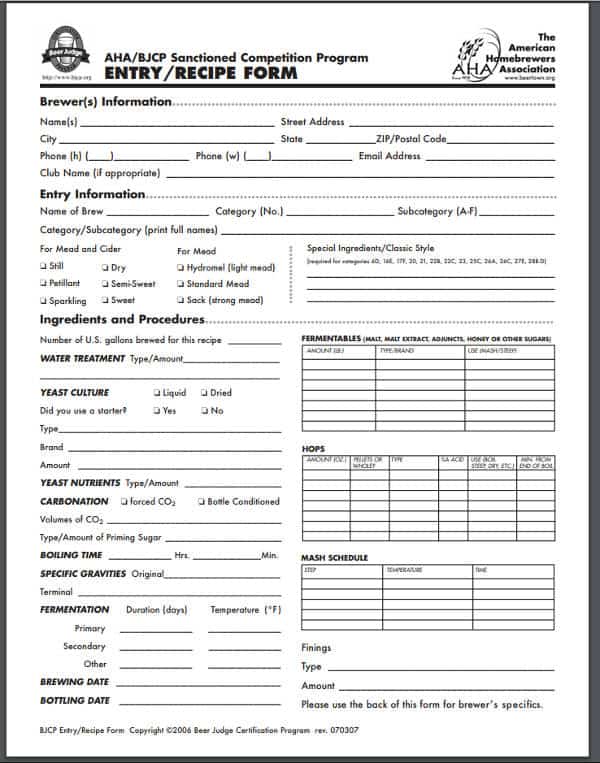
On the Entry/Recipe Form for most American Homebrewers Association beer brewing competition, you are required to include full details about your beer recipe.
You need to include the following Information:
Entry information
- name of brew
- category number
- subcategory (if applicable)
Ingredients and procedure
- Total brew yield (even if only samples entered into the competition)
- Water treatment
- Fermentable ingredients
- Hops
- Mash schedule
- Yeast culture (liquid/dried)
- If a yeast started was used or not
- Yeast: type/brand/amount
- Yeast Nutrients: type/amount
- Carbonation: forced carbonation/bottle conditioned
- Information on the volume of CO2 (forced) or priming sugars (bottled)
- boiling time
- specific gravities: OG/FG
- Fermentation; duration/temperature for both primary & secondary
- finings: type/amount
- brewing date
- bottling date
How much does it cost to enter a beer competition?
On average, the entry fee, when there is one, ranges from $5 to $30 per entry, often being less than $10. It’s also worth remembering that you are also responsible for shipping your beer to the judges. All in all, joining a competition is relatively inexpensive.
Do I have to be present at the competition?
For the most part, beer competitions are organized and carried out away from the public, often at a judge’s home or in an office. There are however bigger public events which you can choose to be present if you want. However, most prize-winning brewers will never have to leave the comfort of their homes.
When is the deadline for a competition?
As a general rule the deadline for a beer competition will be 5-7 days before judging. The final date for submission is clearly indicated in the guidelines for any given competition, so pay close attention to that date. Any late entries will not be judged and no refund will be given of the fees paid.
Tips to win a beer competition
Beer Champion tip #1: Sanitation
As with any brew day, making sure that your brewing equipment is extremely clean is vital when preparing for a competition. Although off-flavors can make a very good beer when desired, when they aren’t supposed to be present they can really hold you back!
If you are planning to brew a batch for a competition, make sure that you are particularly thorough with your cleaning both of your equipment and brewing area. Sanitize it will a good solution two or three times. Also, consider using small amounts of bleach in your fermenter to rid it of any smells (rinse thoroughly after) When judges taste your beer they will always smell it first. if there is the hint of bacterial infection, they will more than likely eliminate you from the runnings there and then. So be clean!
Beer Champion tip #2: Carbonation
Getting the carbonation of your beer right is also essential and is a pet peeve of many judges on the circuit. As you will be most likely shipping your beer to the judges, this means bottle conditioning the beer.
You need to ensure that you have added enough priming sugar to your bottled beer to ensure adequate carbonation in the bottle. You also need enough time for the yeast to fully attenuate. Another concern is that you don’t overprime your beer and produce over-carbonated beer as your competition entry.
The best thing to do to avoid this is to have a few test runs. Use a good beer priming calculator and brew a few batches to make sure that your beer is being properly carbonated and how long this takes to occur. This is particularly important if you have been force carbonating your beer in kegs of late.
another thing you can test in your trial runs is exactly how long your beer takes to read the perfect level of carbonation, and whether it loses any of that gas over time. Remember that you need to send this beer to your judges and you will have a deadline to do it in. So, planning the right day to brew is essential.
Beer Champion tip #3: Shipping Beer
Nine times out of ten you are going to be required to ship your beer entries to the judges. Most competitions aren’t public events and others will be out of your state or even outside your own country. So, getting your beer there in one piece is really important.
So, again, set up a trial run. If you have friends or family in the same location as the beer competition HQ or even the same relative distance away, why not send them a beer? You can check how long the beer takes to travel, how well it travels (in terms of taste and carbonation) and whether or not it arrives safely. Failing this, just send it to yourself. Don’t send beer through the normal postal service as this is illegal in most states, instead organize a pick up from your place of work or a friends place with FedEx or UPS, and label your shipment as “liquid yeast samples”. This will still give a decent idea of what to expect in terms of shipping.
Expert tip: When you have a good idea of how long it will take and the condition of your beer when it arrives you can try to arrange for your beer to be delivered or dropped off on the very LAST day before the deadline. This will ensure that your beer stays refrigerated for the longest amount of time and doesn’t sit in the heat for days before it is tasted.
Beer Champion tip #4: Keep your recipe simple
Don’t feel that you have to give your beer recipe everything you’ve got in order to win a competition. In fact, trying to do too much at once can dramatically inhibit your chances of being successful.
If you must include adjuncts, try to pick one or two at the most. Start with a good grain bill and just try to concentrate on making that one extra ingredient pop. It’s your job as a brewer to stand out from the other beers on the judging table. Brewing an expertly balanced beer with a little unexpected twist is a sure fire way of doing that!
Beer Champion tip #5: Read the guidelines CAREFULLY
Every competition is, of course, different, but most follow the guidelines set out by the Beer Judge Certification Program (North America) as their members who predominately judge the competitions. Reading the guidelines for the beer which they will and will not accept into the competition is important.
Some fellow brewers have described the competition culture as too traditional but it’s still a very valid learning forum so make sure that you play by their rules so that you can benefit from the experience, and hopefully win your category to boot!
Beer Champion tip #6: Don’t waste time inventing your own beer
Many new brewers either waste time creating their own recipes from scratch or are put off by the misconception that their beer entry has to be totally unique. This simply isn’t the case.
The best course of action for most brewers is to take a recipe that has already done well in a previous competition and then start working off of that. Check out this great recipe book for past winners on Amazon. There is no such thing as plagiarism in brewing and you aren’t going to be penalized for using someone else’s recipe. The true intention of any beer brewing event is to test the skill of the brewer rather than his or her creativeness in recipe conception.
Beer Champion tip #7: Make sure the beer fits the category
In some ways, trying to categorize a beer is almost impossible. Just because you have used similar ingredients doesn’t mean that two beers will resemble each other closely.
It’s your job as the brewer to make sure that you can identify the characteristics of your beer and then successful match them to the correct competition category. Even though you may have brewed a stout, it may not have the qualities which will make it shine next other stouts. In most cases, ignore what is on the label of your beer and concentrate on what it smells, tastes and feels like as you drink it. This will be a better guide for you when choosing the right category to compete in.
Beer Champion tip #8: Train your beer palate
If you really want to brew excellent beer and blow away the competition, then you need to know how to truly appreciate your and any other beer. Being able to identify subtle aromas, flavors and the mouthfeel of your beer will help you to improve it where necessary.
This may sound daunting, but nearly anyone can improve their ability to taste and appreciate beer. It just takes a little bit of practice and determination. I’ve written an entire article on this topic, so check it out if you want to improve your beer palate!
Beer Champion tip #9: Don’t reveal all your ingredients
Although you are required to clearly state your recipe from the ingredients you have used to the timing and temperature of various stages in your brewing process, you don’t have to tell all.
If you are using a particular ingredient which is some mild in its effect on the finished beer, then it may cause more harm than good to reveal it. Say that you are using honey as a bottle primer which would only give a very slight hint of honey aroma or flavor to your beer. If you list honey as an ingredient and the judge can’t easily detect it, this is marked against you. So, if you can’t easily pinpoint a particular ingredient (as an adjunct) in your beer then perhaps omitting it from your recipe form would be best!
Beer Champion tip #10: Split test your beer
If you have been consistently brewing good beer from a favorite recipe, not feel like you have to stop there. Use this as a base to go above and beyond what you thought was capable.
Split your next brew into several smaller batches and experiment with one adjunct at a time. Equally, try slightly different fermentation temperatures or try dry hopping (where appropriate) in different quantities and at different times. Also, experiment with your bottling procedure as well as with priming levels and aging schedules.
The more you experiment the more you will learn about what is possible. Also, that one brew could breed several different winning entries!
Beer Champion tip #11: Test the waters with friends & family
I know what you are thinking, but I don’t mean just serve your beer at your next barbecue and then bask in your glory.
Instead, treat your friends and family as beer judges. Set up a blind tasting where you offer up a few of your creations with a few commercial beers thrown in as a control group. Don’t tell your subjects which beers are yours and which aren’t. Do this enough and you will be able to tell how your beer stacks up against the professionals and which beer the masses like best.
If you find that your friends and family aren’t that adept at drinking beer or even don’t care for the glorious beverage that we call beer, consider doing them a good turn. I’ve written an entire article on how to help people like beer who claim they hate it. Check it out here.
Beer Champion tip #12: Carpet bomb
If you are all about that ribbon then don’t pigeon hole yourself to just one type of beer. Hit the brew shop and get supplies for a variety of beer styles and target as many categories as you are allowed to enter (check the rules for each particular competition).
This will not only give you the experience of brewing different types of beer outside your own comfort zone but will also give you the best chance of winning something;
Beer Champion tip #13: Brew with a buddy
When it comes to most competitions there is a limit to how many beers a brewer can submit. However, if you have a brewing assistant, then you can enter more. If your friend enters as a separate contestant, then that’s twice as many beer that you can enter. Just be prepared to allow your friend to take the prize in their name even if it was your recipe and equipment used to brew that beer
Beer Champion tip #14: Join a local club
If you haven’t done so already, you should be interacting with other brewers as often as you can. Not only will you get the benefit of their combined experience and successful approach, but you’ll also be able to exchange recipes that are winners.
Local homebrew clubs often run their own competitions or tasting challenges and this is a great place (in addition to friends and family) to test out your beer on other people. This group is much more likely to give you constructive criticism which you can actually use.
Beer Champion tip #15: Be a prolific Entree
As with my tip about entering different beers in different categories, also make sure that you enter your beer in several competitions. Of course, this is going to enable you to increase your chances of winning a prize, but there is another benefit too.
Although most judges have been through some sort of professional training, this isn’t always the case. Also, not all judges are made equally. It’s entirely possible that the same exact beer will be judged very differently by one person to the next. This is why you need to take any comments on your beer with a pinch of salt. Of course, if the same comments keep surfacing, this is when you need to sit up and pay attention.
Beer Champion tip #16: Watch your temperatures
Of course, winning a prize in a beer competition isn’t just about tactics and ‘underhanded’ practices, it’s about the beer.
Make sure that you are as accurate with the brewing process as possible, this is especially true when it comes to temperature. The temperature of your wort during different stages of your brew day and subsequent fermentation and carbonation can greatly alter the quality of your beer.
If your latest batch is intended for the judging table then make sure you have put your phone on silent and sent your family out for the afternoon. Also, double check the temperature control in your brewing space and storage area. Leave nothing to chance!
Beer Champion tip #17: Go under cover
If you really are stump after a few attempts at winning a prize and you know that you are making pretty good beer but not making it to the next stages, what options are open to you?
Well, one of the best ways to get inside a judges’ head is to become one yourself. Anyone can apply and the training isn’t too expensive or rigorous. Taking this extra step is also really fun and helps you improve your knowledge and appreciation of beer.
What’s more, after you have judged other people’s beer and seen the real level of your competitors it can certainly help you tweak your own creations to rise above the rest.
Beer Champion tip #18: Keep your finger on the pulse
Beer has its trends just like anything else. Even if most styles of beer are fantastic in their own right, some varieties of beer get more of the spotlight. So if you really want to win a prize, you may need to swallow your pride and start swallowing what the majority of beer drinkers are raving about.
What I mean by this is that in most competitions similar beer varieties are judged together. The winner of these categories is then often entered into the ‘best of the shop’ heats. If you’ve brewed something like a light American lager it might be hard to outperform beer with more character, even if you’ve brewed the best example of that beer the world has ever seen. Ok, it’s not fair but that’s how most of these competitions go, so don’t swim against the current.
So, try brewing the most talked about beer at the time of reading this, I’m sure that this is going to give you an edge in any competition especially if you add your own little take on it.
Beer Champion tip #19: Be a big fish rather than a little one
If you are going to be happy with any prize and don’t necessarily care about being the overall winner, then you can use popular beers in another way.
In recent years IPAs have exploded in popularity. I personally love a nice hoppy IPA and can’t think of anything better in most situations, but I still appreciate other styles too. The issue in most events for brewing beer at the moment is that popular beer variety categories have very stiff competition. Sometimes it’s just impossible to compete.
However, if you identify another category with less popularity but still plenty of room for creativity, you could more easily overshadow the other entries. So, if you really do want to win a prize then it may be a question of just picking the right battles to fight!
Beer Champion tip #20: Change what you can, accept the rest
This is really a tip for your sanity if for nothing else. In beer, as in life, there is only so much that you can control. You have power over the ingredients you use and the parameters of your brewing process, you can even control your wort’s exposure to bacteria. However, what you cannot control is what happens to your beer when it leaves you.
Things like where your beer falls in the tasting line up are beyond your control (and knowledge). If your beer has been sitting open waiting to be drunk, it may change in character to what it could have been if sampled earlier.
Also, you can’t control how your beer is stored and at what temperature after it arrives at its destination. You can try to minimize its stay with the judges with your shipping date, but nothing else.
So, as you can’t control this you can only try and collect data by entering the same beer in different competitions. At least this may give you a better overall picture of how it was received by the judging community
Beer Champion tip #21: Know your beer’s prime
(Poetic font) From the day you brew it, every beer begins dying (end poetic font). It’s true, beer has a definite shelf life and you want to make sure it reaches the beer competition you are competing in during its heyday.
The best and only real way to know this is to brew the beer several times and measure how it performs over time. Depending on the beer it may change its characteristics for the better (or worse) as it ages. It’s important that you take detailed notes so that you can appreciate these changes.
In addition to these more in-depth observations, basic things like not waiting enough time for a beer to fully compete its bottle conditioning can seriously hamper its full potential. So, as a rule of thumb don’t enter a beer that you haven’t made a least a half dozen times.
Beer Champion tip #22: Double down on a winner
When you receive the fantastic news of a competition win it’s not time to sit back and revel in your glory, get back into that brewing room! This is especially true if the same recipe has won more than once.
If you really want prizes then you should reenter any winning beer into as many competitions and as many appropriate categories as you can. Do it quickly before your fellow entrees catch onto your success and try to emulate you.
Although beer brewing is, for the most part, a very convivial pastime, there is nothing wrong with making the most out of a winning recipe. You’ve worked hard to get where you are, so make sure you make the most of it while you can!
Beer Champion tip #23 Take your shoes off
No beer is ever going to be perfect, at least I’ve never tasted one that is. The process of brewing is so fraught with variables that can change and sabotage our efforts, that it’s just unrealistic to demand perfection of ourselves.
So, rather than taking the attitude of “it’s all or nothing”, rather think about brewing contests as a challenge to be a little better than the next brewer.
You know the joke about the two hikers in the wood who meet a beer upon which point one hiker starts taking off his boots. You don’t need to be the fastest runner, you just need to outrun the other guy. This should be your approach to brewing at a competition level. It will greatly relieve the pressure that you would otherwise be under!
Beer Champion tip #24 Fraternize with the enemy
This last tip is really for any budding brewer who is entering their first competition, although veteran brewers can still pay attention to it.
One of the biggest challenges other than brewing your beer is understanding the rules and guidelines of any given competition. If you are finding it hard to grasp the finer details, get in touch with a registered judge. You can do this best by talking to your local brewing club or going to a local brew shop.
Don’t suffer in silence. The brewing community is very welcoming and anyone dedicated enough to become a judge is going to be willing to help you with your entry and any other questions you may have.
